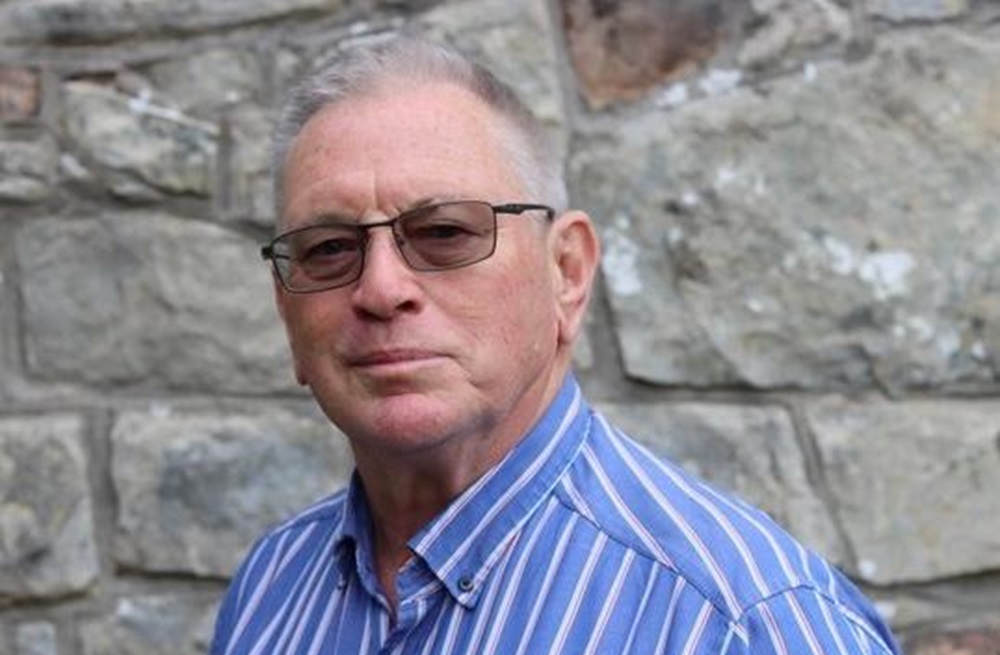On Being a Poet from Wales: Tony Curtis
 Tony Curtis
Tony Curtis
Seren recently published Leaving the Hills, my eleventh collection of poems: at my age, it could be my last.
And that explains the title, which refers to Aldous Huxley and his wife having to escape the Bel Air wildfires of 1961 and having to decide which of their possessions to load into the car – cigars gifted by Groucho Marx? A blade from Balliol? Isherwood’s inscribed copy of Goodbye to Berlin?
In fact, the original choice for the book’s cover was a photograph of that wildfire, but the L.A. Times copyright proved too complicated.
In any case, the Hanlyn Davies painting we’ve used is a fine and intriguing image of another sort of leaving and remembering, a calennig from his birthplace in Gorseinon. The poems in this collection are what I choose to keep and share from the last eight years since From the Fortunate Isles: Poems New and Selected came out.
And as we were halted at a red light
Before the Hollywood Boulevard en route
Rooms hurriedly booked at the Chateau Marmont
I started to float, my body’s weight left there
On the cool leather of the limousine.
I felt
Extraordinarily clean, extraordinarily clear.
Given more time,
That could have been a fresh start.
Reflection
Given the time, I might be able to see this collection as a jumping off point, as well as a reflection of my sixth decade of writing and publishing poetry. It certainly has the range and scope that both readers and myself would expect.
Other poets are manifest in my reading – Michael Longley, Dannie Abse, Helen Dunmore, Glyn Jones – and artists – Jack Crabtree, Charles Burton, Alan Salisbury, David Nash, Rozanne Hawksley and, of course Hanlyn Davies. The collection has a number of photographs – seven of Chuck Rapoport’s 1965 Aberfan photos, one of Debussy, a couple of the boxer Jimmy Wilde, and one of the circus works of Peter Lavery, “Caroline Gerbola on Conchita”:
We’d seen the best of it –
the beautiful girl, the horse as big as a house
kneeling down for her and for us
because of what her legs had said to it
and her being one and the same with that magnificent beast.
That poem is set in Ireland, as is my take on the visit of Gerald of Wales in the Twelfth Century to determine the state of the Faith in that country, “Of Barnacles, Geese and Other Wonders”.
Other period pieces include two from C19th west Wales – a botched execution in Carmarthen and the trial of Anne James accused of killing her new-born baby and throwing its body down a pit-shaft owned by my relative, James Barrah. “Woodham’s Scrapyard” traces a line from the graveyard of rusting locomotives in Barry to my roots in Berkshire and Carmarthen linked by the G.W.R., “God’s Wonderful Railway”.
This collection spans the range of my interest: there is a sequence of five jazz poems:
‘I’ve got a big sound. It’s deceptively mellow but it carries,’
It’s night music, the sad music of the going man.
Then ashes poured from your saxophone case by your grandson.
(Scattering Stan Getz)
As well as one which links the great ballet dancer Sir Frederick Ashton with slavery. There are poems about sport – Jimmy Wilde, “The Tylorstown Terror”, Ali’s fights with Sonny Liston, and the four minute mile man Roger Bannister. And my dying friend from our Pembrokeshire Schools rugby front row, “Visiting the Big Man”:
At school I’d see him power over the line
with half the opposition pack scattered
and the others still clinging to him,
the rest of us trailing behind:
half a century ago.
I am resolutely no longer a confessional poet but there are personal poems about my granddaughter, Kate, and my last days in my mother’s Pembrokeshire village of Lydstep as the pandemic closes life down:
This county’s a long way from anywhere,
and closed to visitors now: the police run checks.
Our Headland’s been an Iron Age promontory fort,
a narrow strip to defend with the sea at your back.
In the war, Mum’s friend Reg had held a rope
over the edge near Whitesheet Rock above the crashing sea
for school mates to raid the crevice nest for gull’s eggs.
‘Big and rich, but tasting of fish. Still, we was so hungry.’
Leaving the Hills really does bring things up to date, for two very recent poems from this spring were included with the approval of my editors as the book was going to press. “Woodham’s Scrapyard” was joined by another poem concerning food, “Madame des Lapins” in which friends who have a house in France source a fresh rabbit for the table:
We eat what we have to eat – Stalingrad, the Irish Famine.
At the end, in St. Malo when the Germans locked the gates and battened down
Against that terrible bombing, there was no cat, dog, or rat to be seen.
Just “Lapins du Boche”, the bones picked clean.
When the water and food runs out, when our Green concerns fail, in the end, what will we decide to keep? Some poems, I hope.
Leaving the Hills by Tony Curtis is published by Seren. It is available from all good bookshops.
Support our Nation today
For the price of a cup of coffee a month you can help us create an independent, not-for-profit, national news service for the people of Wales, by the people of Wales.






